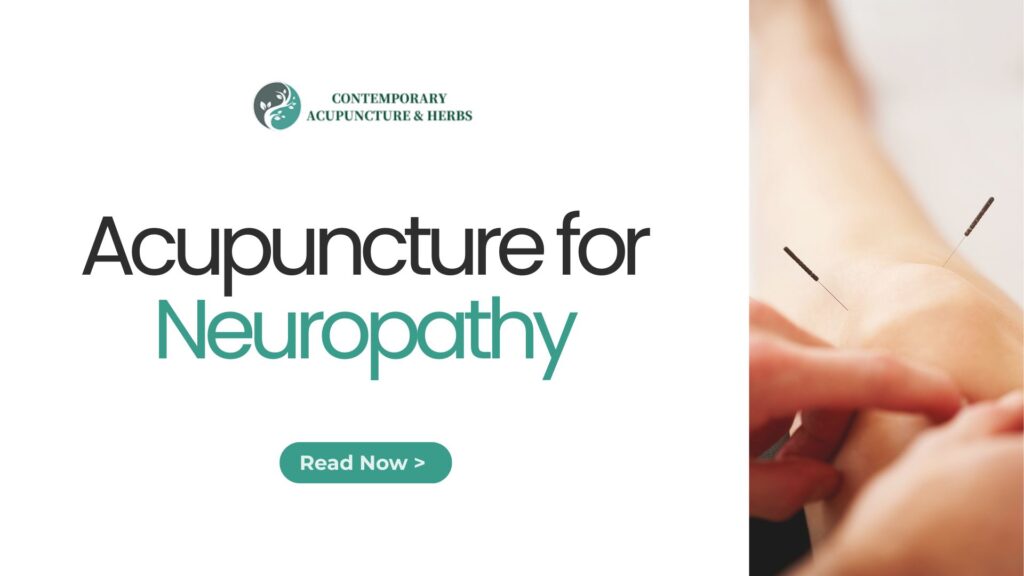Living with neuropathy can be overwhelming. The burning, tingling, or numbness that comes with nerve damage often disrupts daily routines and affects quality of life in ways that are hard to explain unless you’ve felt it yourself.
At our clinic, we meet many people who share these challenges, and we understand how frustrating it can feel when standard treatments only go so far.
Acupuncture offers a gentle, supportive option that may help ease these symptoms and bring a greater sense of comfort. While research continues to grow, studies already show encouraging results for several types of neuropathy, including those linked to diabetes, chemotherapy, and shingles.
Our goal in this guide is to walk with you through what the evidence says, how acupuncture works, and what you might expect if you choose this path of care.
We believe that informed choices empower healing. By combining science with compassion, we hope to provide clarity, reassurance, and practical guidance for anyone exploring acupuncture as part of their journey with neuropathy.
Considering Acupuncture for Neuropathy?
We provide individualized treatments to help ease burning, tingling, and numbness so you can move through daily life with more comfort. Every plan is tailored to your needs and guided by both research and compassionate care.
What is Neuropathy?
Neuropathy is a broad term that describes damage to the nerves outside of the brain and spinal cord. These nerves play an important role in:
- How we feel sensations
- How we move our muscles
- How automatic functions are regulated, such as blood pressure or digestion
When these nerves are injured or weakened, the messages between the body and brain can become disrupted.
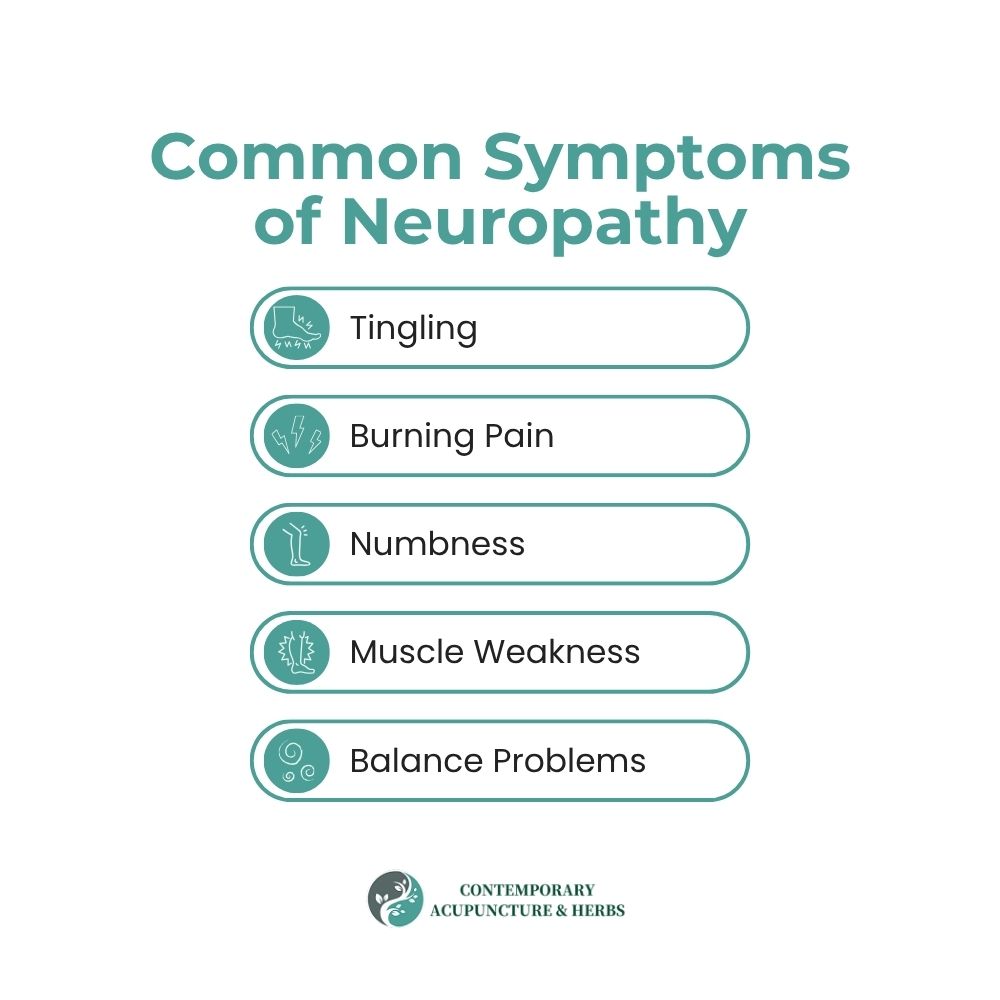
Common symptoms may include:
- Tingling or pins-and-needles sensations
- Burning, stabbing, or electric-like pain
- Numbness in the hands or feet
- Muscle weakness
- Changes in balance or coordination
Common causes of neuropathy include:
- Diabetes (the most frequent cause)
- Chemotherapy treatment
- Viral infections, such as shingles
- Physical trauma or injury
- Autoimmune conditions
Regardless of the cause, living with neuropathy can make everyday activities like walking, sleeping, or even holding a cup of coffee more difficult.
Our role as practitioners is to support patients in finding safe, effective approaches that reduce discomfort and restore a greater sense of well-being.
Acupuncture is one option that many people turn to for this purpose, and in the following sections we’ll share how it works and what the research shows.
Different Types of Neuropathy and Acupuncture’s Role
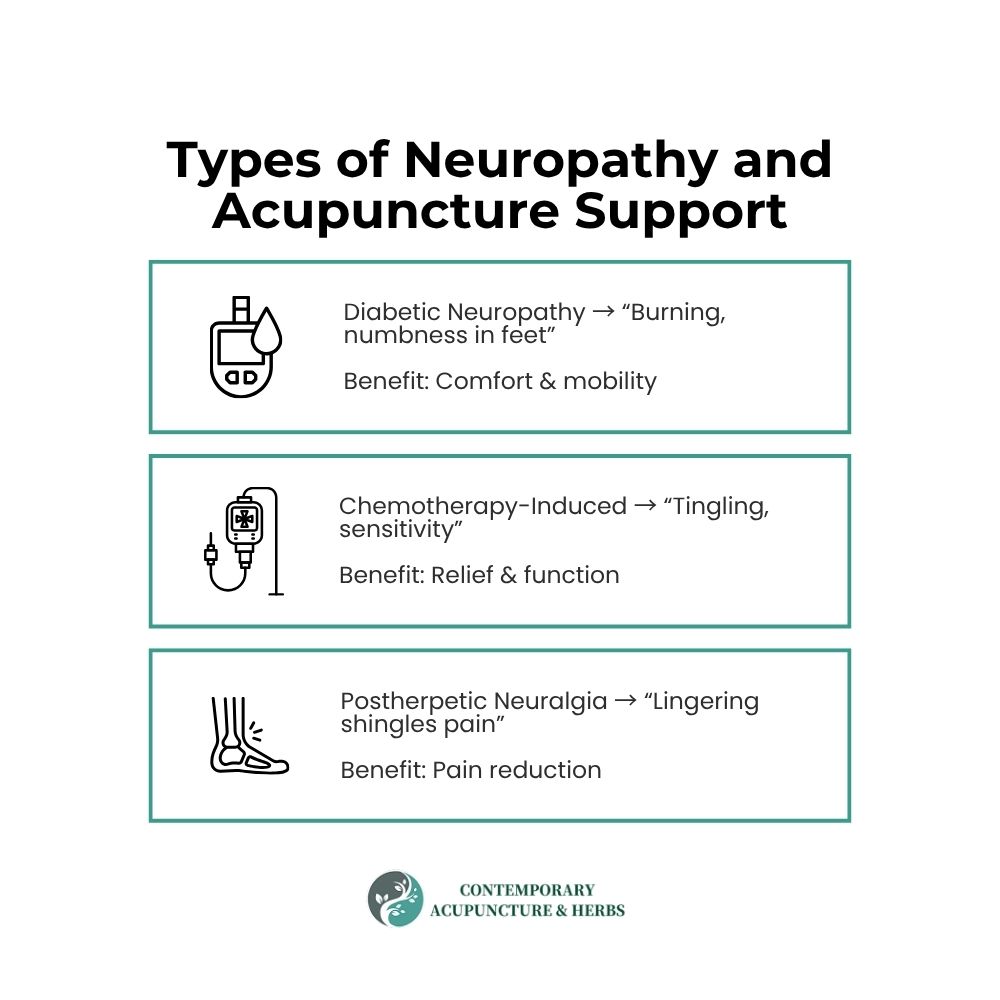
Not all neuropathy is the same. The cause of nerve damage often shapes both the symptoms patients experience and the way acupuncture may be used to provide support.
Diabetic Peripheral Neuropathy (DPN)
One of the most common forms of neuropathy, DPN affects the feet and legs, sometimes the hands. Patients often describe burning, numbness, tingling, or sharp pain.
We often see patients with diabetes looking for relief from persistent foot pain that medications do not fully control. Acupuncture may provide another layer of support to help them feel more comfortable in daily life.
Chemotherapy-Induced Peripheral Neuropathy (CIPN)
Many cancer treatments, especially chemotherapy drugs like platinum-based or taxane medications, can damage nerves in the hands and feet. Symptoms include tingling, numbness, and painful sensitivity, which can affect mobility and daily function.
In our clinic, we often hear from patients undergoing or recovering from chemotherapy that acupuncture offers gentle relief without adding more medication to their regimen.
Postherpetic Neuralgia (PHN)
PHN is nerve pain that lingers after shingles. It can cause sharp, burning, or aching pain in the affected area, sometimes lasting months or years.
For patients living with ongoing shingles-related nerve pain, acupuncture can provide a safe, complementary option that helps ease discomfort and restore some sense of normalcy.
Research Evidence: Does Acupuncture Work for Neuropathy?
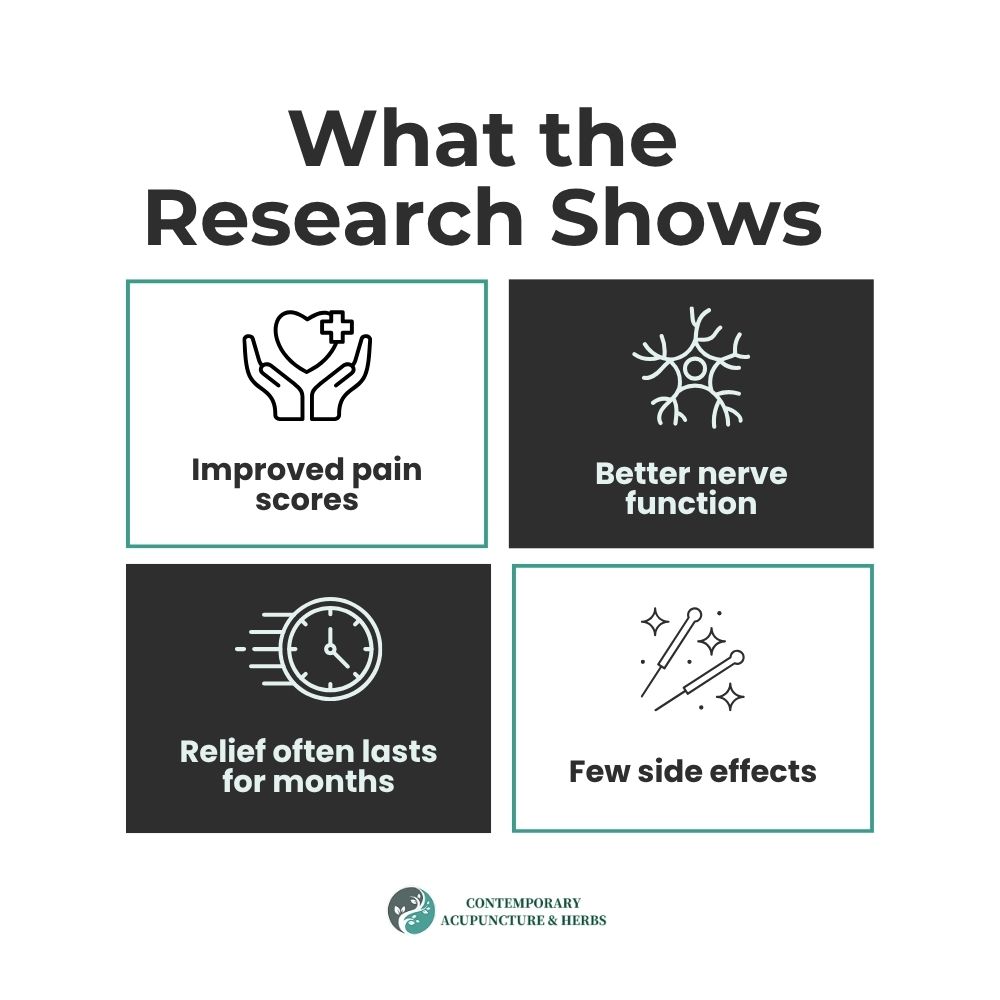
The scientific community has devoted significant attention to studying acupuncture for neuropathy. A growing number of randomized controlled trials (RCTs) and systematic reviews suggest that acupuncture can offer meaningful relief for certain types of nerve-related pain.
While results vary across studies, the overall evidence points to improvements in pain, sensation, and quality of life for many patients.
Key findings from research include:
- Diabetic Peripheral Neuropathy (DPN): A recent study found that acupuncture significantly improved pain scores and nerve function in patients with diabetes when compared with conventional care.
- Chemotherapy-Induced Peripheral Neuropathy (CIPN): A systematic review reported that acupuncture was superior to placebo in reducing pain severity and improving daily function for patients experiencing neuropathy after chemotherapy.
- Postherpetic Neuralgia (PHN): Clinical trials have shown that patients with nerve pain after shingles report improved comfort and reduced pain following acupuncture treatments.
Systematic reviews and meta-analyses highlight that acupuncture is often associated with:
- Reduced pain scores compared to control groups
- Improvements in nerve function and sensitivity
- Few reported side effects when delivered by trained practitioners
One important question patients often ask is how long the benefits of acupuncture last. Clinical trials suggest that many individuals notice improvement after several weeks of consistent treatment.
For some, relief can continue for months, especially with regular follow-up sessions. In practice, maintenance treatments such as once or twice per month after an initial series may help sustain results over time.
At the same time, these reviews also point out limitations in the research, such as:
- Small sample sizes in many clinical trials
- Variability in acupuncture techniques and point selection
- A need for larger, long-term studies to confirm results
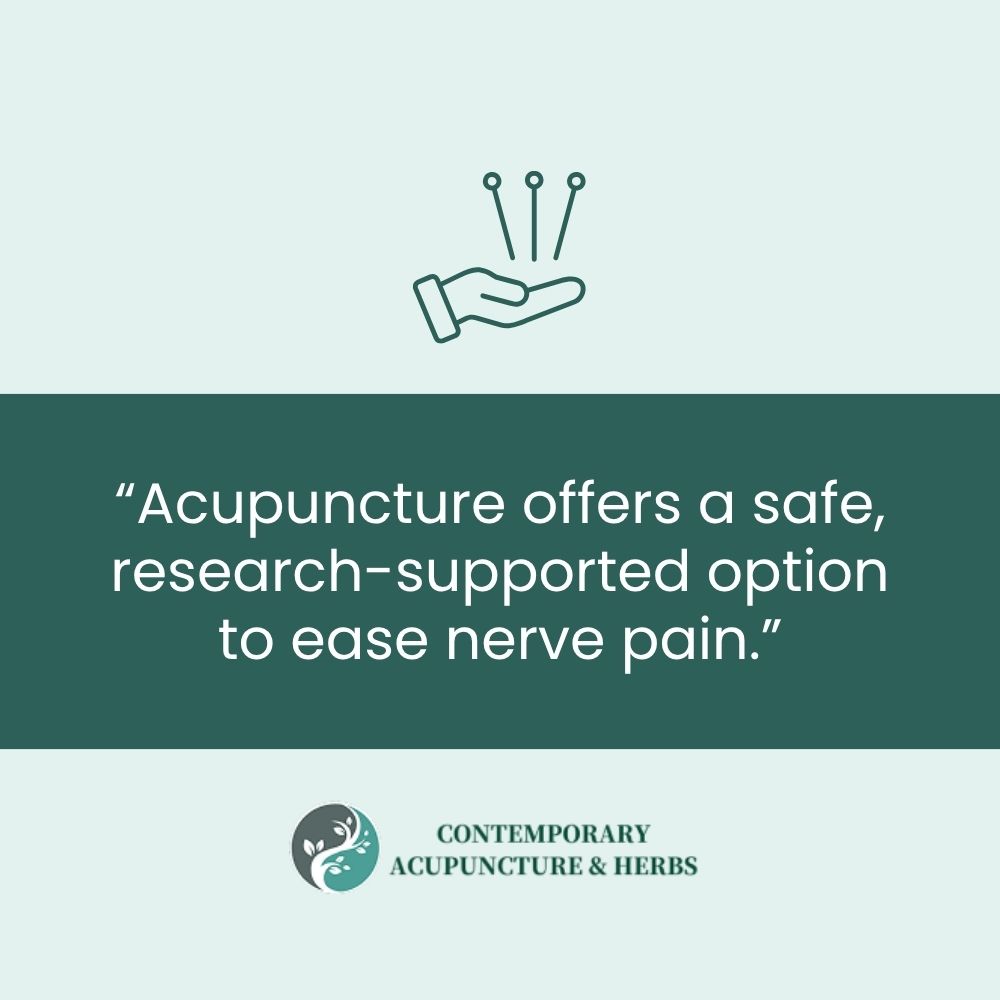
Find Support Beyond Medications
Neuropathy can make even simple daily tasks challenging. Acupuncture offers a safe, research-supported option to help reduce pain, ease tingling, and bring more comfort to everyday life.
Schedule a consultation and explore your options.
How Acupuncture May Work: Mechanisms of Action
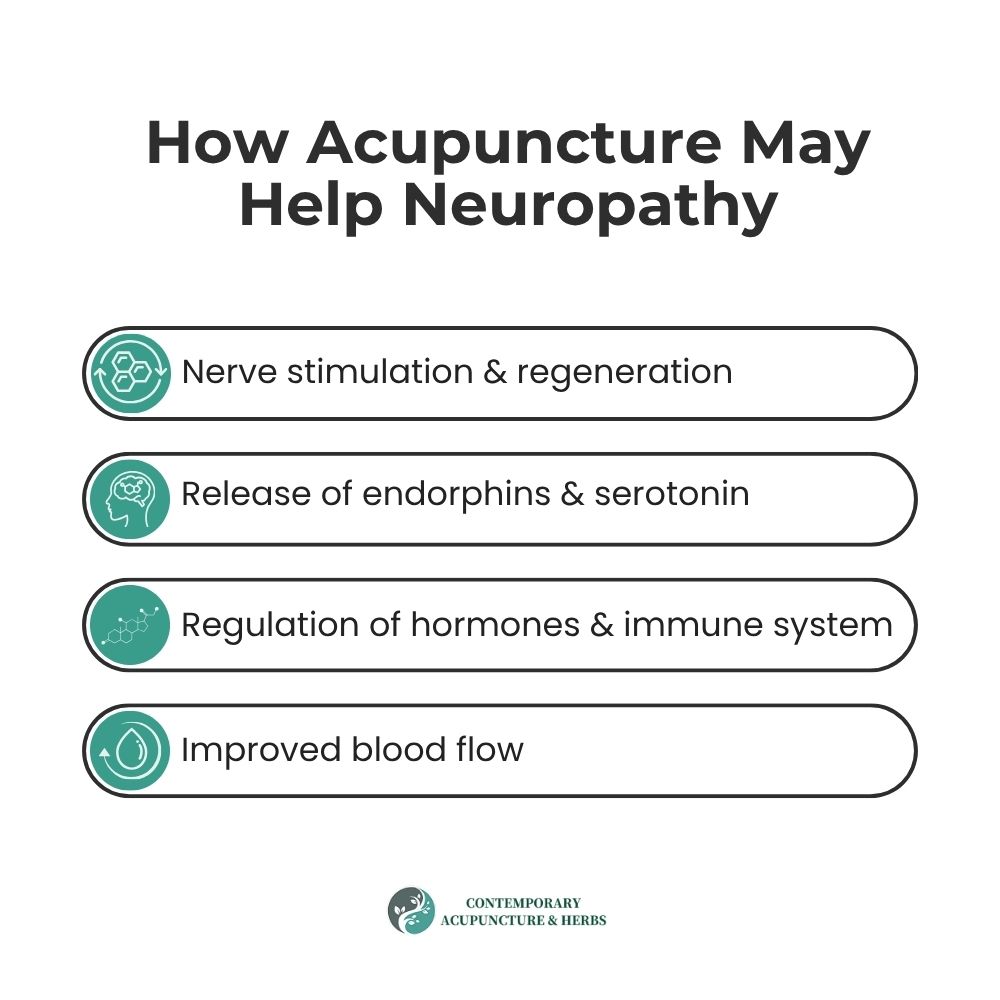
Researchers continue to investigate how acupuncture helps relieve neuropathy symptoms. While the traditional explanation centers on the flow of Qi and balance within the body, modern studies suggest several biological mechanisms that may account for its effects.
Proposed mechanisms include:
- Nerve stimulation and regeneration: Acupuncture needles may activate peripheral nerves, which can encourage healing and improve the way signals travel between the body and brain.
- Release of neurotransmitters: Treatments are linked to increased release of endorphins and serotonin—chemicals that reduce pain perception and improve mood.
- Regulation of the neuroendocrine-immune system: Acupuncture may influence hormones and immune responses, creating an environment that supports nerve repair and reduces inflammation.
- Improved blood flow: By enhancing circulation around nerves, acupuncture can help deliver oxygen and nutrients needed for recovery.
- The “Deqi” response: Patients often describe sensations like tingling, heaviness, or warmth during treatment. Researchers suggest these sensations reflect nerve activation and the release of local signaling molecules.
Electroacupuncture and Neuropathy
In addition to traditional manual acupuncture, many studies on neuropathy highlight the use of electroacupuncture—a method where a mild electrical current is applied through the needles. This approach is thought to:
- Provide stronger stimulation of nerves
- Promote better circulation and nerve regeneration
- Enhance pain relief for conditions such as diabetic and chemotherapy-induced neuropathy
From our perspective, both the traditional and modern views add value. Some patients find comfort in the concept of restoring balance and energy flow, while others connect more with the scientific explanations.
We believe both perspectives can work together to explain why so many people with neuropathy find acupuncture helpful.
Treatment Specifics in Practice
When acupuncture is used for neuropathy, the treatment plan is usually personalized. Frequency, technique, and point selection can vary depending on the cause of neuropathy and the severity of symptoms, but there are some general patterns that patients can expect.
Typical frequency and duration:
- Many treatment plans begin with 1–2 sessions per week for 4–6 weeks.
- As symptoms improve, sessions may be spaced further apart (e.g., every 2–4 weeks).
- Some patients choose occasional “maintenance” visits to help sustain progress.
Common modalities used:
- Manual acupuncture: The traditional method, involving the gentle insertion and stimulation of very fine needles.
- Electroacupuncture: A mild electrical current is applied to the needles to provide stronger stimulation, often used for nerve-related pain.
- Other techniques: Depending on the practitioner, methods like acupressure, moxibustion (gentle heat therapy), or cupping may be used alongside needling.
Frequently used acupoints for neuropathy:
- ST36 (Zusanli): Located just below the knee, this point is often chosen to support nerve function and circulation in the legs.
- GB34 (Yanglingquan): Found near the outer knee, linked to muscle and nerve health.
- SP6 (Sanyinjiao): On the inner leg above the ankle, used to support blood flow and balance.
- LI4 (Hegu): Between the thumb and index finger, known for relieving pain and calming the nervous system.
Most patients describe the treatment as comfortable, with sensations ranging from a light tingling to a gentle heaviness around the needle site. Many find sessions relaxing enough to drift into a light nap.
What to Expect During Your First Acupuncture Session for Neuropathy
For many people, the first acupuncture visit feels very different from a typical medical appointment. Our goal is to create a space that feels safe, comfortable, and supportive while we learn about your health and begin treatment.
Consultation
We start by listening to your health story. You’ll be asked about your neuropathy symptoms, overall medical history, lifestyle, and goals for care.
This helps us design a treatment plan that addresses your specific needs, whether it’s easing burning pain, improving sleep, or restoring mobility.
Treatment Process
Very fine, sterile needles are gently placed at selected points on your body. These points may be near the area of discomfort (such as the legs or feet) or on other parts of the body that influence nerve function and circulation. Insertion is usually not painful. Many patients describe only a light pinch or mild tingling.
What you may feel:
- A gentle heaviness, warmth, or tingling around the needle site.
- A wave of relaxation, often deep enough that some patients fall asleep.
- In some cases, a subtle shift in nerve sensations, such as reduced burning or improved comfort.
Session length and follow-up:
- The treatment portion usually lasts 20–40 minutes, depending on the plan.
- After the session, it’s normal to feel calm or even slightly drowsy.
- Your acupuncturist will discuss how often treatments may be recommended and what kind of progress to expect.
We see each first visit as the beginning of a partnership. Our intention is not only to provide immediate relief but also to guide you toward steady, lasting improvement with regular care.
Safety and Side Effects
Acupuncture is widely regarded as a safe therapy when performed by a licensed and properly trained practitioner. Large-scale reviews consistently report that serious complications are rare. Most patients tolerate treatments well, even when sessions are repeated over long periods.
Common, mild side effects may include:
- Light bruising or redness at the needle site
- A temporary feeling of soreness or heaviness in the treated area
- Mild fatigue or drowsiness after a session
These effects are generally short-lived and resolve without intervention.
Rare but possible risks include:
- Infection if sterile, single-use needles are not used
- Injury to nerves or organs if needles are inserted improperly
- Worsening of symptoms if treatment is performed by someone without appropriate training
Because of these rare but preventable risks, it is essential to seek treatment from a licensed acupuncturist who follows strict safety and hygiene protocols.
Choosing a Qualified Practitioner
Finding the right acupuncturist is an important step in feeling safe and confident with your care.
Neuropathy requires thoughtful, consistent treatment, so it’s helpful to choose someone who is both highly trained and attentive to your individual needs.
Credentials to look for:
- State licensure: In most states, acupuncturists must be licensed to practice.
- NCCAOM certification: The National Certification Commission for Acupuncture and Oriental Medicine ensures that practitioners meet national standards for training and safety.
- Specialized experience: Ask if the practitioner has worked with patients who have neuropathy, as this can guide their choice of techniques and treatment plans.
Questions you may want to ask:
- How many years have you been in practice?
- Do you have experience treating diabetic or chemotherapy-induced neuropathy?
- What is your recommended treatment schedule, and how do you measure progress?
- What steps do you take to ensure safety and comfort?
Other signs of a good fit:
- The practitioner takes time to listen to your concerns.
- You feel comfortable in the treatment space.
- They provide clear explanations of the process and answer questions openly.
We believe the therapeutic relationship is just as important as the needles themselves. When patients feel heard and supported, the treatment process often feels more reassuring and effective.
Complementary Strategies to Combine with Acupuncture
Acupuncture can play an important role in easing neuropathy symptoms, but we often find the best results come when it’s part of a broader plan for health. Small, steady changes in daily habits can support nerve health and enhance the benefits of treatment.
Lifestyle and self-care approaches:
- Blood sugar management: For patients with diabetes, keeping blood sugar in a healthy range is one of the most important ways to slow nerve damage.
- Regular movement: Gentle exercise such as walking, tai chi, or swimming can improve circulation, reduce stiffness, and support balance.
- Stress reduction: Mind-body practices like meditation, yoga, or breathing exercises may ease pain perception and calm the nervous system.
Nutritional support for nerve health:
- B vitamins (especially B12 and B6): Support healthy nerve function and repair.
- Omega-3 fatty acids: Found in fish, flax, and walnuts, these can help reduce inflammation.
- A balanced diet: Eating whole foods rich in vegetables, lean proteins, and healthy fats gives the body the nutrients needed for healing.
Other therapies that may complement acupuncture:
- Physical therapy: Helps improve strength, flexibility, and balance.
- Medications as prescribed by physicians: Acupuncture may reduce the need for higher doses of pain medication, but it is not a replacement.
- Supportive devices: Shoe inserts, braces, or mobility aids can help make daily activities safer and more comfortable.
We often remind patients that healing is a journey. By combining acupuncture with thoughtful lifestyle changes and medical support, many people find they can manage neuropathy symptoms more effectively and regain a greater sense of ease in daily life.
Find Relief From Neuropathy With Personalized Acupuncture Care
Neuropathy can touch nearly every part of daily life, from the way we move to how we rest.
While there is no single solution that works for everyone, the research on acupuncture continues to show promising results for easing pain, reducing tingling and numbness, and improving overall comfort.
For many, this gentle therapy offers a way to feel more at ease and supported in their healing journey.
At our clinic, we approach neuropathy care with both compassion and evidence. We listen to your experiences, tailor each treatment plan to your unique needs, and provide a safe, calming space where healing can unfold.
Acupuncture is not a cure, but it can be a powerful part of a broader care plan that supports both body and mind.
If you are living with diabetic neuropathy, chemotherapy-related nerve pain, or the lingering effects of shingles, we invite you to explore how acupuncture might help. Together, we can work toward greater comfort, mobility, and peace of mind.

